Related Research Articles

The Indonesian National Armed Forces are the military forces of the Republic of Indonesia. It consists of the Army (TNI-AD), Navy (TNI-AL), and Air Force (TNI-AU). The President of Indonesia is the Supreme Commander of the Armed Forces. As of 2023, it comprises approximately 400,000 military personnel including the Indonesian Marine Corps, which is a branch of the Navy.

Laskar Jihad was an Islamist and anti-Christian Indonesian militia, which was founded and led by Jafar Umar Thalib. At present, the militia is believed to have disbanded.

The Indonesian Army is the land branch of the Indonesian National Armed Forces. It has an estimated strength of 300,400 active personnel. The history of the Indonesian Army has its roots in 1945 when the Tentara Keamanan Rakyat (TKR) "People's Security Army" first emerged as a paramilitary and police corps.

The Kopassus is an Indonesian Army (TNI-AD) special forces group that conducts special operations missions for the Indonesian government, such as direct action, unconventional warfare, sabotage, counter-insurgency, counter-terrorism, intelligence gathering and special reconnaissance (SR). Kopassus was founded by Alexander Evert Kawilarang and Mochammad Idjon Djanbi on 16 April 1952. It gained worldwide attention after several operations such as the Indonesian invasion of East Timor and the release of hostages from Garuda Indonesia Flight 206.

The State Intelligence Agency, commonly referred to as BIN, is Indonesia's primary intelligence agency. The BIN is also responsible for coordinating intelligence activities among various intelligence agencies, including military intelligence, police intelligence, prosecutors intelligence and other relevant entities.
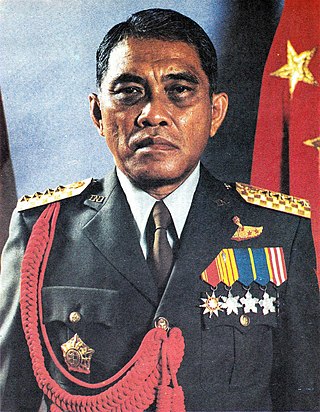
General (Ret.) Leonardus Benjamin Moerdani was the ABRI Commander from 1983 to 1988 and also served as Indonesia's Minister of Defense and Security. He is famously remembered due to his strong stance in many decisive situations in Indonesian political and social life. He was also significant as a leader who was Catholic in a predominantly Muslim community.
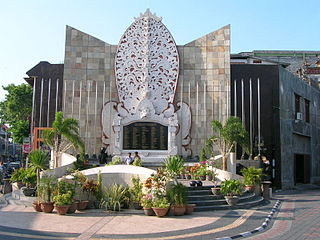
Terrorism in Indonesia refer to acts of terrorism that take place within Indonesia or attacks on Indonesian people or interests abroad. These acts of terrorism often target the government of Indonesia or foreigners in Indonesia, most notably Western visitors, especially those from the United States and Australia.

Alexander Evert Kawilarang was an Indonesian freedom fighter, military commander, and founder of Kesko TT, which would become the Indonesian special forces unit Kopassus. However, in 1958 he resigned his post as military attaché to the United States to join the rebel Permesta movement after the Incidents in Manado where he encountered Kopassus as his opponent. His involvement in Permesta damaged his military career, but he remained popular and active in the armed forces community.

Garuda Indonesian Airways Flight 206 was a Garuda Indonesia flight that was hijacked on 28 March 1981, by the Komando Jihad in Indonesia. The McDonnell Douglas DC-9 plane PK-GNJ was hijacked on a domestic flight and forced to land at Don Mueang International Airport in Bangkok, Thailand. The hijackers demanded the release of their confederates from Indonesian jails and issued other demands. Three days later, the aircraft was stormed by Indonesian special forces. In the ensuing operation, all five hijackers were killed, while the pilot and one Kopassus operative were fatally wounded. All passengers were rescued.

The Kopasgat is the air force infantry and special forces corps of the Indonesian Air Force. The corps is also known as the Orange Berets from the colour of their service headgear. Kopasgat is trained to seize and defend airfields from enemy forces known as Operasi Pembentukan dan Pengoperasian Pangkalan Udara Depan , airborne operations, and other specific military operations within the scope of the Indonesian Air Force.

Dharma Wiratama Museum, officially the Dharma Wiratama Central Army Museum is a military museum centred on the history of the Indonesian Army from its inception in 1945 up through the coup of 30 September 1965 and Indonesian peacekeeping missions. It is located in the former national army headquarters in Yogyakarta.

The 1997–1998 activists kidnappings were abductions of pro-democracy activists which happened between the 1997 Indonesian Legislative Election and the fall of Suharto in 1998. The kidnappings took place in three different phases: before the May 1997 Indonesian legislative elections, two months before the People's Consultative Assembly (MPR) session in March 1998 and in the period just before Soeharto's 21 May resignation. None of those abducted during the first and third period have reappeared. Some of the activists who were abducted in the second period have openly spoken about their experiences.

Luhut Binsar Pandjaitan is an Indonesian politician, businessman, and retired four-star Army general who has been serving as Coordinating Minister for Maritime Affairs and Investment since October 2019. He previously served in various posts in his political career, including the Coordinating Minister for Maritime Affairs from July 2016 to October 2019, Coordinating Minister for Political, Legal, and Security Affairs from August 2015 to July 2016, and Chief of Staff to President Joko Widodo. He was also Minister of Trade and Industry in President Abdurrahman Wahid's cabinet and Indonesian Ambassador to Singapore from 1999 to 2000.

Major General (Ret.) Muchdi Purwopranjono is an Indonesian politician and former major general who served briefly as chief of the Indonesian Army's Special Forces (Kopassus) and was former deputy head of the State Intelligence Agency (BIN). He was relieved of command duties in 1998 after the fall of Soeharto and was subsequently deemed responsible for abductions of pro-democracy activists. In 2008, he was acquitted of commissioning and assisting in the 2004 assassination of human rights campaigner Munir, following a trial deemed flawed by human rights organizations. He is presently the leader of a breakaway faction of Tommy Soeharto’s Berkarya Party and his leadership is recognized by the government.
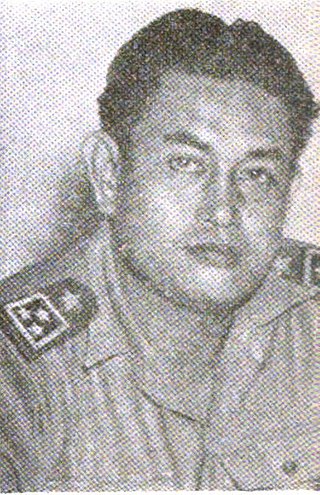
Colonel Maludin Simbolon was an Indonesian military officer, independence fighter, and Minister of Foreign Affairs in the Revolutionary Government of the Republic of Indonesia's (PRRI) Cabinet.
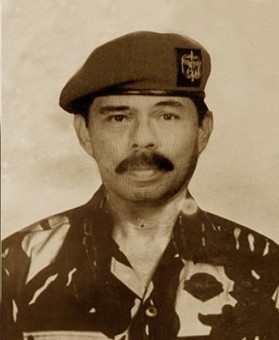
Sintong HamonanganPanjaitan is a retired Indonesian army officer who graduated from the National Military Academy in 1963. Military Advisor to President BJ Habibie, Secretary for Development Operational Control of Kodam IX/Udayana, and Danjen of Kopassus. He received 20 operation orders at home and abroad during his military career. He was removed from his position as regional military commander due to the Dili incident at the Santa Cruz cemetery in 1991, which causing the decline of his career in the military before retiring with the rank of lieutenant general.
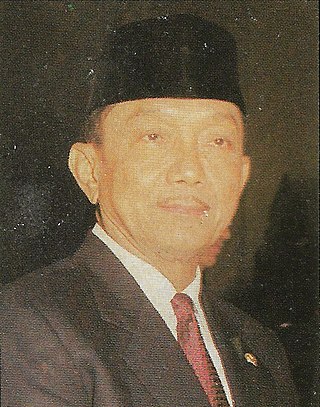
Raden Muhammad Yogie Suardi Memet was an Indonesian military officer who also served as Minister of Home Affairs under Suharto between 1993 and 1998, and as Governor of West Java between 1985 and 1993. He was also commander of the special forces unit Kopassandha and of the Siliwangi Military Region.
References
- 1 2 Terrorist Organization Profile – START – National Consortium for the Study of Terrorism and Responses to Terrorism
- ↑ No Man's Land: Globalization, Territory, and Clandestine Groups in Southeast Asia, p. 24
- ↑ Kingsbury, D, We must not get back in bed with Kopassus, The Age, August 14, 2003
- 1 2 3 Pusat Data dan Analisis Tempo (2020). Sejarah Awal ABRI Mendekat Kelompok Islam (in Indonesian). Jakarta: Tempo Publishing. ISBN 9786232627871.
- ↑ Muqoddas, M. Busyro (2011). Hegemoni Rezim Intelijen; Sisi Gelap Peradilan Kasus Komando Jihad (in Indonesian). Yogyakarta: Pusat Studi Hak Asasi Manusia Universitas Islam Indonesia. ISBN 9789791097840.
- ↑ Soeharto's Komando Jihad chickens come home to roost - smh.com.au
- ↑ Conboy, Kenneth J. (2003). Kopassus : Inside Indonesia's Special Forces (1st Equinox ed. 2003 ed.). Jakarta: Equinox Pub. pp. 280–289. ISBN 978-9799589880. OCLC 51242376.
- ↑ "Woyla, Terorisme Pertama di Indonesia". okezone.com (in Indonesian). Retrieved 16 January 2016.
Peristiwa pembajakan pesawat Garuda DC-9 Woyla jurusan Palembang-Medan pada tanggal 28 Maret 1981, menjadi "Jihad" pertama bagi para pelaku terorisme di Indonesia.